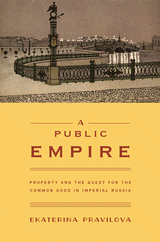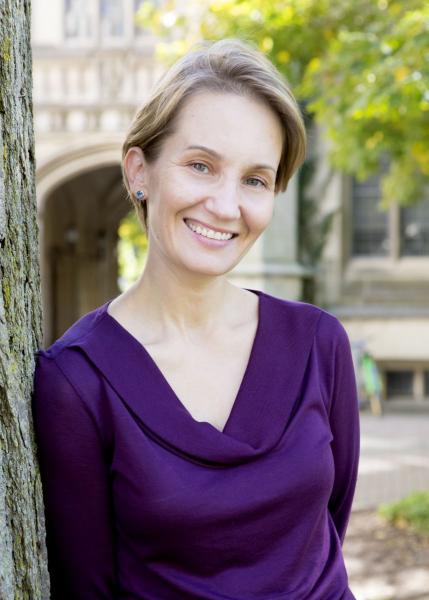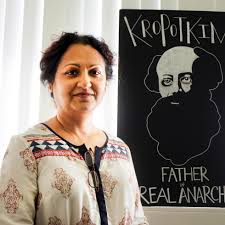A Public Empire: An Interview of Ekaterina Pravilova
Choi Chatterjee (Cal State University, Los Angeles)

Exploring the Russian ways of thinking about property, Ekaterina Pravilova’s book A Public Empire: Property and the Quest for the Common Good in Imperial Russia, (Princeton University Press, 2014) looks at problems of state reform and the formation of civil society, which, as the book argues, should be rethought as a process of constructing “the public” through the reform of property rights. Professor Pravilova’s book was awarded the 2015 Vucinich Prize.
Are you an accidental revolutionary or did you plan to completely revise our understanding of the evolution of public and private property relations in tsarist Russia?
I’ve never thought about my work in such terms, but yes, it was more or less accidental. I came to this topic through the back door: my initial plan was to write a history of environmental projects in prerevolutionary Russia. While analyzing major plans aimed at reversing the flow of rivers, building dams and hydroelectric stations, I noticed that the main stumbling block for their further advancement had not been the technical impossibility of the projects themselves, but the existing legal regime of property rights. In Russia, water was private, and that principle rendered the realization of any projects—technically feasible or not—unthinkable. I was fascinated by the debates on the legal status of rivers and decided to explore this matter further. Surprisingly, the question of property dominated all discussions on the exploitation and preservation of rivers and lakes, forests and minerals. This trend suggested that something big and important was happening in the Russian system of property rights on the eve of the Revolution. So, I decided to focus on this unexplored and fascinating subject: the emergence of public domain in Imperial Russia. In other words, I wanted to study how things that had been seen as inherently private came to be viewed as public.
Did you have a working thesis when you first began your research on this incredibly complex subject, or were you surprised by the disruptive and provocative nature of your findings?
I did not have a working thesis when I first embarked on this project. When I began my research I realized that the conventional narrative about the insecurity of private property in Imperial Russia was inaccurate, to say the least, as my findings suggested the opposite. Private ownership in Russia was more dominant and extensive than in most European countries: the monarchal state protected private domain, while liberals struggled to limit the power of owners. This was truly a revelation for me. It was also challenging to write against the dominant historiographical paradigm, which equated private property with freedom, whereas the history of this institution in the modern era suggests that this equation is wrong. Private property, a product of the legislative efforts of governments and enlightened monarchs, was used as a tool to solidify social support for the throne. It also represented the favorite device of colonial administrators who helped appropriate lands through “civilizing” legal reforms, and so on. The proponents of res publica claimed that true freedom is possible only if individual rights are balanced with common interests. Freedom should not be individualistic.
The regime of property in Russia was inefficient, but we cannot measure the efficiency of this institution simply by considering the security of private possessions. Property is a very complex system of norms, practices and relations. My book emphasizes the fluidity of property relations and shows how the imagined border between the world of private and public things was changing over time and under the influence of various factors.
Another important goal of my work was to demonstrate that property relations involved more than two actors, namely private owners and the state. Previous works on property in Russia overlooked the presence of a third participant: society, or the public. Although the emergence of public domain signaled the emergence of civil society in Russia, the failure to institutionalize this new kind of property in law reflected the marginal political status of the public.
Did you encounter any resistance when you presented the initial findings from your book? How did criticism strengthen your work?
I received immense support from my colleagues. Some of them were more skeptical than others, but their criticism helped strengthen my argument. When you draw comparisons across areas that constitute entire fields of study, such as environmental history and the history of art and literature, there is always a danger of overlooking details or overemphasizing similarities. I remember that somebody objected to my comparing such distinct areas as forestry and literature, and this criticism pushed me to make these parallels more accurate and focused.
Given the incredibly vast range of your sources, did you devise a research methodology that enabled you to see patterns across the domains of property as disparate as art markets, literature, rivers and forests -- one that you would recommend to scholars tackling similarly ambitious themes?
My sources often guided the search. In debates on the ownership of forests I frequently came across references to discussions about monuments, the proponents of liberating rivers from the strictures of private ownership often referred to the status of city streets, and so on. Modern conflicts around public domain and private property rights also suggested further directions for inquiry. It was fascinating to see the historical roots of contemporary debates on historical preservation, copyright, and environmental protection, and to even trace back the vocabulary of modern conceptions of property. Not all of my chapters ultimately got into the book because I wanted to keep it within reasonable limits. The world of res publica in Imperial Russia was bigger than the one that my book presents.
In fact, the gap between these seemingly disparate areas - nature, art, and literature - is not all that broad. The central protagonists of my book are “experts”—engineers, art historians, archaeologists, and foresters—who played key roles in advancing notions of the public good. Each of these groups had its own ethos, but ultimately their strategies of self-organization and public activity were quite similar. I read their main journals and the materials of professional congresses and meetings, and tracked the activity of unions and the development of important scholarly or scientific ideas. Interestingly, the most critical concepts that evolved during this period turned out to be connected to understandings of the public interest. For instance, scholars formulated criteria for “national literature,” “art,” and “historical heritage,” and defined the life cycle of ecosystems and their relation to human society. All of these newly discovered entities were supposed to become part of the public domain, society’s main asset.
I also worked with the archival materials of governmental institutions that considered legislative initiatives coming from the professional organizations. Yet a book concentrating on laws and academic debates would have been one-sided. In the center of each chapter I have thus placed at least one story that helps anchor my argument and show how changes in the ideas and practices of property relations affected the lives of real people. The book opens with the case of Count Kutaisov, jester to Paul I and owner of the fishing monopoly that Alexander I expropriated. It tells the stories of Princess Tenisheva, a wealthy collector of Russian antiquities, and the peasant Evgeny Briagin, a talented restorer of icons; both the princess and the peasant were persecuted for violating the sanctity of church property. I also tried to explain the meaning of Lev Tolstoy’s surrender of his copyright and show that his actions make sense if we consider them in the context of debates on public property. One of the chapters discusses Ivan Goncharov’s protest against the violation of privacy by champions of public interest who wanted to access the private papers of great Russian writers immediately after their deaths. The shrinkage of the private sphere was one of the consequences of the growing public domain.
Can you tell us how your work has been enriched by using an explicitly comparative framework of analysis?
The book refutes narratives of Russia’s exceptionality by putting this story in the context of contemporary European ideas and practices. The concept of public property had come from Roman law, was picked up by the authors of the French Code Civil in 1804, and then penetrated other pieces of legislation. In the late nineteenth century this idea received new attention due to the growing interest in social law and policy, a liberal alternative to leftist ideas. I reveal that Russian thinkers followed European debates closely, and their ways of thinking about property often paralleled European intellectual trends. However, bureaucrats in the central government thought that there could be no “public” outside of the state and that society could not be a subject of rights on its own. Intellectually, the Russian idea of property was in no way inferior to other concepts of property in circulation at the time. Yet the political regime that rested on the institution of private property was simply incompatible with res publica.
Comparison was indispensable for this project because it helped me show that a single pattern for property relations is unthinkable. The emergence of public domain represented, perhaps, the most central trend in the development of property, state, and society in Europe and elsewhere during the nineteenth and early twentieth centuries. But within this trend one can finds many variations, and the Russian case represents one of them.
When I read your brilliant book about the changing concepts of public property, I felt that it was particularly relevant in the context of climate change and globalization. How does your work contribute to competing theories about the evolution of “commons” and public domains?
The works of Carol Rose and Elinor Ostrom, the main theoreticians of the commons today, were immensely important for my project. I share their idea that private property is not always the best and the most effective ways of owning resources. The proponents of public domain in Imperial Russia thought that society was able to manage resources collectively, and could actually do better than private owners in preserving public domain for future generations.

Ekaterina Pravilova is a Professor of History specializing in 19th century Imperial Russia at Princeton University. A Public Empire: Property and the Quest for the Common Good in Imperial Russia also won the George L. Mosse Prize 2015, American Historical Association; the 2015 Historia Nova Prize, Mikhail Prokhorov Foundation and Academic Studies Press; and was awarded Honorable Mention for the 2015 J. Willard Hurst Book Prize, Law and Society Association.

Choi Chatterjee is Professor of History specializing in Russian and Soviet History, History of Globalization, Cultural History, Gender History at Cal State Los Angeles
